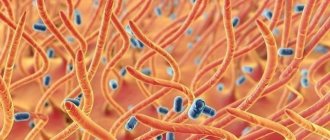An infectious disease doctor specializes in the diagnosis, treatment, and prevention of infectious diseases. Studies in detail the occurrence, mechanisms of development and clinical manifestations of infectious diseases caused by the entry of pathogenic microorganisms into the body. In their work, infectious disease specialists rely on data from epidemiology and microbiology. Infectology is a branch of medicine that deals with the causes, diagnosis and treatment of infectious diseases.
Content
- What does an infectious disease specialist treat?
- What does a pediatric infectious disease specialist treat?
- In what cases should you contact an infectious disease specialist?
- Consultation stages
- Diagnostics
- Treatment
Infectious diseases include diseases caused by microscopic harmful organisms that have entered the body and are transmitted from a sick person to a healthy person.
An infectious disease specialist deals with:
- providing medical care to patients with pathologies of an infectious nature, including the provision of ambulance and emergency care;
- specific diagnosis of infectious diseases using modern research methods;
- monitoring adverse reactions and effects of medications;
- carrying out anti-epidemic measures;
- conducting consultations with patients.
Since infectious diseases can be caused by viruses, bacteria, pathogenic fungi and helminths, an infectious disease doctor works closely with doctors of other specialties and the sanitary-epidemiological service.
Non-transmissible blood infections
The pathogen enters the circulatory system through the use of a single injection needle or tattooing if a healthy person has been transfused with infected blood. Such diseases include:
- hepatitis;
- AIDS.
These diseases are very severe, occur in a chronic stage with constant relapses, and are incurable. Therapy is aimed at maintaining life and reducing the incidence of exacerbation of the symptomatic picture.
What does an infectious disease specialist treat?
An infectious disease specialist treats a wide range of diseases, which can be divided into several groups:
- intestinal infections, in which the pathogen enters the intestines through the mouth during food intake, is carried by unwashed hands, etc.;
- vector-borne blood-borne diseases that cause insect bites (mosquitoes, fleas, ticks, etc.);
- non-transmissible blood poisoning, in which the spread of diseases occurs through the use of contaminated needles, medical instruments or household items (razors, toothbrushes, etc.);
- infectious diseases of the respiratory tract, in which the pathogen enters the body through airborne droplets or through the use of common household items;
- skin infections that spread through contact;
- STDs (sexually transmitted diseases).
The names of many diseases correspond to the name of the pathogen that causes these diseases.
An infectious disease specialist treats such fairly common intestinal diseases as:
- Salmonellosis. This disease is caused by Salmonella, which is one of the four main causative agents of acute intestinal infections in humans. Salmonellosis, which is diagnosed annually in every tenth person in the world, is characterized by intoxication and damage to the gastrointestinal tract.
- Dysentery, which is caused by Shigella, is a genus of rod-shaped gram-negative bacteria. WHO estimates that 80 million people are diagnosed with dysentery each year, and about 700,000 cases are fatal. Dysentery is characterized by damage to the gastrointestinal tract (mainly the colon) and a general intoxication syndrome, which is caused by endotoxins (some types of Shigella also produce enterotoxins and neurotoxins).
- Botulism, which develops when botulinum toxin, a protein neurotoxin produced by the bacteria Clostridium botulinum that multiplies in the absence of oxygen, enters the body with food, water or aerosols. This powerful poison causes damage to the nervous system, disturbances in the functioning of the nerve centers of the heart and skeletal muscles. As a result of disruption of muscle innervation, acute respiratory failure occurs.
- Helminthiases, which are parasitic diseases of humans. The human body can be inhabited by nematodes, flat and annelid worms, as well as acanthocephalans (more than 400 species of helminths in total). About a billion people in the world suffer from helminth infections. Most helminths are not able to reproduce in the human body and require intermediate hosts. Infection usually occurs by eating food and through water, but some species penetrate the skin (schistosomiasis and hookworm disease) or are transmitted transmissibly (filariasis). The source of infection can be humans or animals.
- Cholera, which is prevalent mainly in developing countries (WHO estimates there were 3-5 million cases of the disease in 2010). This acute intestinal disease is caused by the bacteria Vibrio cholerae (there are about 150 serological variants), which are spread through the fecal-oral route. Cholera is epidemic. Once ingested, Vibrio cholerae affects the small intestine, causing watery diarrhea, vomiting, and rapid loss of fluid and electrolytes, which can lead to hypovolemic shock and death.
- Typhoid fever. This cyclical acute intestinal infection is caused by the bacteria Salmonella typhi, transmitted by the fecal-oral route. Typhoid fever is characterized by fever, general intoxication, roseola-type rashes, enlargement of the liver and spleen, as well as specific damage to the lymphatic system of the small intestine in its lower section.
An infectious disease specialist also treats diseases transmitted by insect bites:
- Malaria or “swamp fever”, which is a group of diseases transmitted by the bites of female mosquitoes of the genus Anopheles (there are tropical, three-day and four-day malaria, as well as oval malaria). The causative agent is parasitic protists that enter the human blood or lymph during blood sucking. The disease is characterized by fever, chills, enlarged liver and spleen, anemia and a relapsing course.
- Typhoid (typhus and relapsing). Typhus is caused by rickettsia, an intracellular parasite transmitted by body lice. This type of typhus is characterized by specific rashes, fever and damage to the cardiovascular and nervous systems. Can be epidemic or endemic. Relapsing fever is caused by spirochetes of the genus Borrelia, which are transmitted by lice and ticks. Relapsing fever is characterized by short-term chills, a feeling of heat, high fever, headaches and muscle pain, nausea and vomiting. Rashes appear at the height of an attack of fever (usually there are two of them with lice-borne typhus and four with tick-borne typhus), the spleen and liver become enlarged, and jaundice may develop. Bronchitis, pneumonia, and signs of heart damage may occur.
- Tularemia is a focal infection caused by the small bacterium Francisella tularensis. The pathogen can enter the human body through contact with animals during hunting, through consumption of contaminated food products, sometimes by aspiration during the processing of grain products, but most often it is spread by blood-sucking insects. Patients present with intoxication, fever, and lymph nodes are affected.
- Yellow fever is an acute disease transmitted by mosquito bites, which is characterized by fever, headache, nausea, vomiting, pain in the back and limbs, icteric discoloration of the skin, puffiness and a red tint to the face. The causative agent is Viscerophilus tropicus, an arbovirus from the flavivirus family.
- Encephalitis, which is a group of diseases characterized by inflammation of the brain. It can be primary and secondary, viral and microbial, toxic, infectious-allergic and tick-borne. Tick-borne encephalitis is caused by the neurotropic tick-borne encephalitis virus, the reservoir and vector of which are ixodid ticks. The patient has fever, intoxication, severe headaches, general weakness, nausea, sleep disturbances, hyperemia of the skin in the upper part of the body and redness of the sclera.
- Plague. This acute, highly contagious disease belongs to the natural focal group of quarantine infections. It occurs in severe form and is accompanied by fever, damage to the lungs and other internal organs, as well as lymph nodes. It has a high mortality rate. The total number of cases annually is about 2.5 thousand people. The causative agent of plague is the plague bacillus, and the reservoir of infection is rodents, camels, lagomorphs and cats. Various types of fleas carry the infection.
An infectious disease doctor also treats various hepatitis and AIDS (non-transmissible blood-borne diseases).
In addition, an infectious disease specialist treats diseases that are caused by:
- pneumococci (otitis, pneumonia, pleurisy, purulent pneumococcal meningitis, arthritis, endometritis);
- mycoplasmas (urethritis, bacterial vaginosis, inflammation of the uterus and appendages, pyelonephritis);
- chlamydia (urethritis, endometritis, salpingoophoritis, salpingitis, prostatitis, orchiepididymitis, chlamydial pneumonia of newborns, etc.);
- Haemophilus influenzae (purulent meningitis, pneumonia, cellulitis, septicemia, epiglottitis, pericarditis, sinusitis, purulent arthritis, etc.);
- legionella (legionnaires' disease);
- mycobacteria (tuberculosis, leprosy, mycobacteriosis).
An infectious disease specialist also diagnoses and treats common respiratory tract infections - measles, tonsillitis, scarlet fever, mumps, whooping cough, influenza, respiratory viral diseases and the less common diphtheria.
It is the infectious disease doctor who treats streptococcal and staphylococcal skin diseases, as well as:
- Poliomyelitis is an infantile spinal paralysis caused by the poliovirus, which attacks the gray matter of the spinal cord. It is a highly contagious disease.
- Rabies is a particularly dangerous fatal disease that is caused by the Rabies virus, which penetrates into the bulbar centers of the brain. The virus enters the body through a bite along with the saliva of a sick animal.
- Tetanus is an acute bacterial disease that spreads through contact and is not contagious to others. The causative agent is a spore-forming gram-positive rod, which is an anaerobic bacterium (lives in an oxygen-free environment).
- Foot and mouth disease is an acute viral disease caused by an RNA-containing picornavirus. Mostly animals are sick, and people are infected in most cases by consuming raw milk from sick animals and its processed products. Infection is possible through consumption of meat from sick animals and transmission of the virus by airborne droplets or contact when caring for animals, or intra-laboratory infection.
- Anthrax is a dangerous infectious disease of animals and humans, which occurs in humans mainly in the carbunculous form. The causative agent is the large gram-positive spore-forming bacillus Bacillus anthracis. The source of infection is sick animals.
- Gas gangrene is a disease caused by the growth and reproduction of clostridial microflora in the tissues of the body (occurs only in the absence of oxygen). Infection occurs when clostridia that live in soil and dust get into wounds.
- Erysipelas is an acute and recurrent disease caused by group A beta-hemolytic streptococcus.
Among sexually transmitted infections, an infectious disease specialist treats syphilis, chlamydia and gonorrhea.
Intestinal diseases
Most types of infectious pathogens enter the human body with dirty hands, unwashed food, unclean water, causing the development of the following diseases:
- typhoid fever;
- salmonellosis;
- botulism;
- dysentery;
- cholera.
These diseases cause severe symptoms similar to those of acute poisoning.
What does a pediatric infectious disease specialist treat?
A pediatric infectious disease specialist is a doctor who is consulted when:
- herpetic infection;
- acute viral hepatitis;
- measles, rubella and mumps;
- enteroviral infections;
- tonsillitis and scarlet fever;
- diphtheria;
- whooping cough and parawhooping cough;
- acute intestinal infections;
- meningococcal infection;
- helminthiasis;
- HIV infections.
A pediatric infectious disease specialist is needed if the child has:
- diarrhea, vomiting, abdominal pain, jaundice, fever and dehydration;
- high temperature, which is accompanied by a deterioration in general condition, pain and aching muscles, various rashes on the skin and mucous membranes.
Notes[ | ]
- Disease ontology database (English) - 2021.
- ↑ 123
Monarch Disease Ontology release 2018-06-29sonu - 2018-06-29 - 2018. - Infectious diseases // Kazakhstan. National Encyclopedia. - Almaty: Kazakh encyclopedias, 2005. - T. II. — ISBN 9965-9746-3-2.
- Great Russian Encyclopedia: [in 35 volumes] / ch. ed. Yu. S. Osipov. — M.: Great Russian Encyclopedia, 2004—2017.
- Infectious diseases // Popular medical encyclopedia / Ch. ed. B.V. Petrovsky. - M.: Soviet Encyclopedia, 1979. - 704 p., ill. (p. 269).
- World Health Organization.
Age-standardized DALYs per 100,000 by cause, and Member State, 2004
(unspecified)
(February 2009). Archived from the original on August 25, 2011. - The World Health Report (Annex Table 2) (undefined)
(pdf) (2004). Archived from the original on August 25, 2011. - Table 5 (undefined)
(pdf) (1995). Archived from the original on August 25, 2011. - Lower respiratory tract diseases include early pneumonia, influenza and bronchitis.
- Intestinal diseases include cholera, botulism and E. coli, among others. See also: Intestinal infectious diseases
- Tropical diseases include Chagas disease, dengue fever, lymphatic filariasis, leishmaniasis, onchocerciasis, schistosomiasis and trypanosomiasis.
- “Infectious and Epidemic Disease in History” Archived November 19, 2012 on the Wayback Machine
- ↑ 1 2 Dobson, Andrew P., Carter E Robin.
Infectious Diseases and Human Population History (English) // BioScience (English) Russian. - 1996. - Vol. 46. - P. 115-126. - doi:10.2307/1312814. - "Smallpox" North Carolina Digital History.
- Multidrug-Resistant "Tuberculosis". Centers for Disease Control and Prevention.
Archived copy from March 9, 2010 on the Wayback Machine - "Influenza of 1918 (Spanish Flu) and the US Navy"
In what cases should you contact an infectious disease specialist?
Consultation with an infectious disease specialist is necessary in cases where the patient suffers from:
- high temperature;
- severe headaches;
- purulent formations on the mucous membranes;
- chronic fatigue;
- sleep disturbances and night sweats;
- nausea, vomiting, diarrhea, abdominal pain, lack of appetite;
- various rashes on the body.
The infectious disease specialist also consults patients with enlarged lymph nodes, redness, itching and swelling of the skin.
This specialist is also necessary for people who have suffered animal or insect bites.
In addition, an infectious disease specialist is contacted for a certificate. A certificate from an infectious disease specialist is needed by the guardianship authorities for adoption, to donate blood, to undergo a military medical commission, to the maternity hospital for certain pathologies of pregnancy, for IVF, etc. For a certificate, you should apply with the results of tests that are necessary for a specific case (for example, for IVF, the results of general blood and urine tests, biochemical blood tests, ELISA, HIV, RW, fluorography are required, and for a military medical commission - the results of tests for HIV and viral hepatitis B and C).
How does an appointment with a specialist take place?
At the first consultation, the infectious disease specialist listens to the patient’s main complaints, studies the nature, frequency and intensity of symptoms. A thorough medical history is collected and studied. The doctor will be concerned about such data about the patient as the presence of bad habits, gastronomic preferences, cases of close contact with sick people, and recent trips to other countries.
After the interview, a physiological examination of the patient is carried out. Immediately after the consultation, the doctor will refer you for laboratory tests, so you need to prepare for a visit to an infectious disease specialist. To do this, you will need to carry out thorough intimate hygiene, not using scented products, not having breakfast, not drinking anything except plain water, and not smoking. The evening before your doctor's appointment, you are prohibited from drinking alcoholic beverages.
Consultation stages
An infectious disease doctor works in an infectious diseases hospital.
Initial consultation includes:
- Studying the patient's complaints and history. The infectious disease specialist clarifies not only the nature and duration of the disease, but also the epidemiological history (contacts with infected people, visits to endemic areas, etc.)
- Physical examination and general examination.
- Ordering additional examinations.
If necessary, the doctor refers the patient for emergency vaccination (if there is a possibility of developing tetanus or rabies) and gives recommendations to prevent the development of an infectious disease in the patient himself or in those around him.
For the initial examination, it is advisable to have the result of a general blood test and fluorography with you.
Sexual infections
The method of transmission of infection is anal, oral, vaginal sex without personal protective equipment. As a result, they develop:
- syphilis;
- gonorrhea;
- chlamydia;
- AIDS.
These diseases are dangerous because over a long period they may not produce a pronounced symptomatic picture, gradually suppressing the immune system and provoking the development of complications. People who have an active sex life with different, untested partners are recommended to visit a doctor for preventive purposes at least 2 times a year.
Diagnostics
Based on the results of the initial examination, the infectious disease specialist refers the patient to:
- General clinical examinations (blood, urine and stool tests).
- A blood test for antibodies, since in almost all infectious diseases it is possible to identify the level of immunoglobulins to the infectious agent or its parts (the level of immunoglobulins G confirms the presence of infection in the body, and the level of immunoglobulins M allows you to determine how acute the disease is).
- PCR analysis demonstrating the reproduction activity of an infectious agent in the body.
- Immunoblot is a laboratory test for the presence of antibodies to HIV in blood serum.
- An immunochromatographic analysis that allows one to detect the concentration of certain substances in biological materials.
- Blood chemistry.
- Serological testing to detect intestinal and respiratory infections.
- Functional diagnostics (ultrasound, ECG, X-ray), which helps determine the condition of internal organs.
- Smears and culture of flora from the nasopharynx or genitals.
Before taking the tests, you should not eat, drink alcohol, smoke, or take medications for 12 hours (if you need to take certain medications, you should inform your doctor about this).
Sections of infectology
Infectology is one of the most extensive branches of medicine, as there are many types of infections. Therefore, before we begin to find out what diseases an infectious disease specialist treats, we should find out what infections this branch studies and how they can get into the human body.
- Transmissible blood infections enter the body through insect bites.
- Non-transmissible blood infections are introduced into the body through contaminated blood, that is, through transfusion of “bad” blood, double use of a syringe, and the like.
- Intestinal infections enter the human body exclusively through the oral route, that is, through unwashed foods and dirty hands.
- Skin infections are transmitted through contact with their carrier.
- Respiratory tract infections are transmitted by airborne droplets, so for them to enter the body it is enough to be in the same room with the carrier of the infection.
You may be interested in: Probing of the lacrimal canal: indications for the procedure, consequences, reviews
Treatment
Treatment of infectious diseases is the fight against a specific pathogen. Since many infectious diseases require urgent care, the infectious disease specialist often first begins symptomatic treatment (oral administration of a solution of rehydration salts or intravenous administration of isotonic solutions to combat dehydration, gastric lavage and antitoxic therapy to combat toxins, etc.).
Based on the results of the tests, depending on the pathogen identified, antibacterial, antiviral, antifungal therapy or anthelmintic drugs are prescribed.
Since many infectious diseases are epidemic in nature, an infectious disease doctor has to monitor the rate of spread of the disease, purposefully identify sick people and, if necessary, impose quarantine.
Prevention[ | ]
Preventive measures:
- disinsection - destruction of potential carriers and vectors of infection (for example, mosquitoes, lice);
- increasing the body's resistance through hygiene and physical education;
- carrying out preventive vaccinations;
- quarantine measures;
- cure the source of infection.
Quarantine is a set of measures to stop the spread of infection. This includes isolating sick people, disinfecting places of residence, identifying those in contact with sick people, social distancing, and so on.










